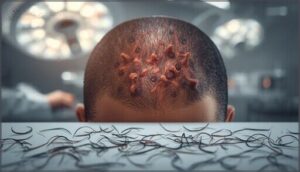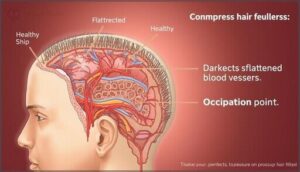This site is supported by our readers. We may earn a commission, at no cost to you, if you purchase through links.

You notice more hair in the shower drain three months after surgery, and your first thought probably isn’t the anesthesia. Most patients who experience post-surgical hair loss attribute it to stress, medications, or recovery challenges—rarely the anesthetic itself.
Yet anesthesia can trigger hair loss through mechanisms that have nothing to do with the drugs entering your bloodstream. The culprit isn’t always the chemical compounds that kept you unconscious; it’s often the physical positioning during prolonged procedures or the cascade of stress hormones your body releases in response to surgical trauma.
Understanding this distinction matters because it shapes both prevention strategies and your expectations for regrowth.
Table Of Contents
- Key Takeaways
- Can Anesthesia Cause Hair Loss?
- How Anesthesia Triggers Hair Loss
- Risk Factors for Hair Loss After Anesthesia
- Is Hair Loss After Anesthesia Temporary?
- Preventing Hair Loss Linked to Anesthesia
- Regrowing Hair After Anesthesia
- Frequently Asked Questions (FAQs)
- How do I stop my hair from falling out after surgery?
- What types of surgery can cause hair loss?
- Can anesthesia cause hair loss?
- Can anemia cause hair loss?
- Does general anaesthetic cause hair loss?
- How does anesthesia affect hair growth?
- Does hair texture change after anesthesia-related loss?
- Can multiple surgeries increase hair loss risk?
- Are certain hair types more vulnerable post-surgery?
- Can stress before surgery worsen hair shedding?
- Conclusion
Key Takeaways
- Hair loss after anesthesia is usually temporary and most often caused by surgical stress or prolonged scalp pressure, not the anesthetic drugs themselves.
- Telogen effluvium, a stress-induced condition, typically leads to noticeable hair shedding one to three months post-surgery, with regrowth expected within six to twelve months.
- Longer surgeries, especially those exceeding four hours or involving head and neck, increase your risk of positional alopecia due to restricted blood flow from immobilization.
- Maintaining balanced nutrition, managing stress, and ensuring proper scalp protection during surgery can significantly reduce your chances of post-anesthesia hair loss.
Can Anesthesia Cause Hair Loss?
Can anesthesia actually trigger your hair to fall out? The short answer is yes, but the relationship isn’t quite what you might expect. Hair loss after anesthesia can occur, though it’s usually temporary and linked more to the stress of surgery than the anesthetic agents themselves.
Anesthesia can trigger temporary hair loss, though it’s usually the surgical stress—not the anesthetic itself—that causes shedding
Most cases involve telogen effluvium, a condition where physical or emotional stress pushes hair follicles into a resting phase. You’ll usually notice shedding several weeks after your procedure, not immediately. The overall risk of sustained hair loss from anesthesia alone remains low. General anesthesia and hypotensive anesthesia have both been associated with temporary thinning, particularly after longer surgeries.
Beyond anesthesia-related triggers, other scalp conditions causing hair loss might contribute to thinning if they’re already present before surgery.
Understanding anesthesia risks helps set realistic expectations. With proper postoperative care and nutrition therapy, your hair regrowth typically follows a predictable timeline. For more detail, you can read about. Surgical stress affects everyone differently, so individual responses vary considerably based on your baseline health and recovery.
How Anesthesia Triggers Hair Loss
Anesthesia doesn’t directly damage your hair follicles, but the surgical experience creates conditions that disrupt normal hair growth patterns. Two distinct mechanisms explain most cases of post-anesthesia hair loss, each operating through different pathways. Understanding these processes helps you recognize what’s happening and when intervention might be necessary.
Telogen Effluvium After Surgery
Surgical stress often disrupts your hair follicles by pushing them prematurely into their resting phase, a condition known as telogen effluvium. This reaction generally emerges one to three months after your procedure, triggered by anesthesia, inflammation, and nutrient deficiency during recovery.
You’ll notice widespread shedding rather than isolated patches. With proper postoperative care, most regrowth patterns normalize within six to twelve months as your follicles resume their regular cycle. To learn more about causes, management, and recovery, see this thorough overview of.
Positional Alopecia and Scalp Pressure
Unlike widespread shedding, positional alopecia creates distinct patches where your scalp contacted the surgical headrest. Prolonged immobilization during anesthesia compresses your scalp, restricting blood flow to hair follicles in the occipital or temporal regions.
This pressure-induced ischemia forces follicles into temporary dormancy. You’ll usually notice these well-defined areas weeks after your procedure, though regrowth patterns usually resume within three to six months once circulation normalizes.
Risk Factors for Hair Loss After Anesthesia
Not everyone who undergoes anesthesia will experience hair loss, but certain factors can increase your risk. Understanding these variables helps you assess your individual situation and have more informed conversations with your surgical team.
Three main categories influence whether you’re more likely to lose hair after surgery.
Understanding these factors can help you explore effective hair treatment options if post-surgical hair loss becomes a concern.
Surgery Duration and Type
Procedures lasting more than four hours markedly increase your risk of positional alopecia due to prolonged scalp pressure under general anesthesia. Complex open surgeries carry higher risk than minimally invasive techniques, while head and neck operations pose additional concern.
Hypotensive anesthesia methods, which intentionally lower blood pressure during surgery, further compound the risk of surgery-related hair loss and surgical complications.
Patient Health and Stress Levels
Preexisting medical conditions, including chronic illness and poor nutritional balance, can predispose you to telogen effluvium following anesthesia.
Elevated stress levels before surgery correlate with increased hair shedding, as anxiety reduction and stress management play protective roles.
Sleep quality disruptions around your procedure may worsen stress and hair loss connections.
Maintaining emotional wellbeing through balanced nutrition and coping strategies reduces your vulnerability to anesthesia-related hair loss.
Anesthesia Techniques Used
General anesthesia with hypotensive techniques lowers your blood pressure during surgery, potentially reducing scalp blood flow and increasing positional alopecia risk. Regional blocks and monitored sedation methods carry lower hair loss risk than prolonged general anesthesia.
Specific anesthetic agents like volatile inhaled anesthetics don’t directly cause hair shedding, but the physiological stress of anesthesia and intraoperative care duration influences your vulnerability to telogen effluvium.
Is Hair Loss After Anesthesia Temporary?
The good news is that hair loss after anesthesia is almost always temporary. Your hair follows a predictable cycle, and when surgery or anesthesia disrupts that cycle, regrowth usually happens on its own.
Understanding the timeline and knowing what to watch for can help you distinguish between normal recovery and situations that need medical attention.
Hair Growth Cycle Disruption
Anesthesia doesn’t directly damage your hair follicles, but surgical stress can push them into a resting phase called telogen effluvium.
Your hair growth cycle has three phases—anagen (growth), catagen shift, and telogen (rest). When surgery or illness disrupts this rhythm, follicles shift prematurely into telogen, causing noticeable hair shedding two to four months later.
Cycle restoration begins once the stressor resolves.
Typical Timeline for Regrowth
Most patients see new hairs emerging within three to six months after shedding begins. Hair Regrowth Phases follow a predictable pattern—short, fine strands appear first as follicles shift back into anagen.
By nine months, Scalp Health improves noticeably, with strands gaining thickness and length. Full Follicle Recovery and hair cycle restoration usually occur between six to nine months, though individual Regrowth Patterns vary based on nutrition and stress management.
Signs Hair Loss May Be Permanent
While anesthesia-related hair loss usually resolves, certain signs indicate permanent follicle damage requiring evaluation. Watch for these warning signals:
- Hair shedding patterns continuing beyond six months without any regrowth rates improvement
- Bald spot treatment showing no response after a full year of consistent intervention
- Scalp health deterioration with scarring or fibrosis where follicle damage prevents regeneration
- Persistent alopecia in identical locations across multiple hair cycles despite adequate nutrition
Preventing Hair Loss Linked to Anesthesia
While you can’t eliminate the risk entirely, you can take practical steps to reduce your chances of post-anesthesia hair loss. These strategies focus on supporting your body before and during surgery, along with minimizing physical stress to your scalp.
Here’s what works based on current evidence and clinical experience.
Nutritional and Lifestyle Strategies
You can strengthen your body’s resilience with a balanced diet rich in protein, iron, zinc, and biotin—these nutrients support hair follicles during recovery. If you’re facing nutritional deficiencies, targeted nutrient supplements under medical guidance can accelerate regrowth.
Stress management techniques like meditation or deep breathing reduce cortisol levels that worsen shedding.
These healthy habits form your foundation for hair loss prevention.
Scalp Care and Positioning During Surgery
Beyond diet and stress, what happens during your operation matters just as much. Surgical draping must avoid adhesive pulling on hair follicles, while patient positioning devices distribute weight across your skull rather than concentrating pressure. Head stabilization prevents prolonged compression over any single area. Your surgical team checks padding every 30–60 minutes, protecting scalp health and minimizing positional alopecia risk through four key practices:
- Foam or gel cushions under high-contact zones
- Periodic reassessment of pressure points
- Temperature control to reduce scalp moisture
- Gentle hair partitioning before draping
Preoperative Medical Consultations
Once your surgical team secures proper positioning, your preoperative consultation brings everything together. This appointment reviews your medical history, current medications, and prior anesthesia experiences to spot hair loss risk factors early. Your anesthesiologist assesses cardiovascular status, nutritional deficiencies, and stress levels, then tailors anesthesia techniques and perioperative planning to protect your scalp while ensuring safe surgical preparation.
| Assessment Area | Key Risk Factors | Protective Actions |
|---|---|---|
| Medical History | Chronic illness, prior telogen effluvium, autoimmune conditions | Document baseline hair health, adjust anesthesia type |
| Medications | Anticoagulants, beta-blockers, retinoids, antiseizure drugs | Review timing, consider alternatives, plan monitoring |
| Nutritional Status | Iron deficiency, low protein, vitamin D insufficiency | Recommend supplements, delay elective surgery if severe |
| Surgical Duration | Procedures exceeding 4 hours, head/neck operations | Schedule repositioning, use memory foam cushions |
Regrowing Hair After Anesthesia
Most people regrow their hair naturally after anesthesia-related hair loss, but you can take steps to support and accelerate the process. Your options range from simple at-home treatments to medical interventions, depending on the severity and duration of your hair loss.
Here’s what actually works, when you need professional help, and how to decide which approach is right for you.
At-Home Treatments and Remedies
Your home routine matters greatly in supporting hair regrowth after surgery. While patience remains essential—most post-anesthetic hair loss resolves within 6 to 9 months—targeted hair care accelerates recovery.
- Gentle Shampoos and Scalp Massage: Use sulfate-free products and massage your scalp 3 to 5 minutes daily to stimulate blood flow and minimize breakage.
- Dietary Supplements: Consume 25 to 35 grams of daily protein plus biotin, vitamin D, and iron to support keratin production.
- Natural Remedies: Apply minoxidil topical treatments or caffeine-containing serums as first-line options for hair restoration.
Medical Therapies and Interventions
When home treatments don’t restore your hair within 9 months, medical therapies offer targeted solutions. Pharmacologic therapies like minoxidil and finasteride reduce hormone-driven shedding in eligible patients.
Corticosteroid injections address inflammatory causes of post-anesthesia hair loss.
For persistent cases, platelet-rich plasma treatments deliver growth factors directly to your scalp, while low-level laser therapy stimulates follicular activity through controlled light energy.
When to Seek Specialist Help
When should you escalate concerns about hair loss after anesthesia to a dermatologist or trichologist? Schedule a specialist referral if shedding continues beyond six months, if you notice sudden bald patches with scalp inflammation, or if hair regrowth timeline deviates from the expected pattern. Emergency care becomes necessary when hair loss signs include infection, severe pain, or visible scarring—surgical complications that require immediate medical evaluation rather than standard medical treatments for hair loss.
- Persistent shedding exceeding six months post-surgery warrants specialist assessment
- Localized bald patches with redness or warmth require urgent dermatologic consultation
- Lack of regrowth by nine months indicates need for thorough medical evaluation
- Bring detailed surgical history, anesthesia records, and medication lists to appointments
Frequently Asked Questions (FAQs)
How do I stop my hair from falling out after surgery?
Like a garden pausing for winter, your hair may rest after surgery. You can’t stop postoperative hair care shedding entirely, but nutrition advice, gentle scalp treatment, and stress management accelerate recovery strategies and support hair regrowth tips naturally.
What types of surgery can cause hair loss?
Major abdominal, cardiac, thoracic, and neurosurgical procedures carry higher risk due to extended operative times and systemic stress.
Bariatric surgery often triggers postoperative hair loss through rapid weight loss and nutritional deficiencies during recovery.
Can anesthesia cause hair loss?
Anesthesia itself doesn’t directly trigger hair loss, but the surgical stress, medications, and physiological changes surrounding anesthesia can disrupt your hair growth cycle, leading to temporary shedding weeks or months later.
Can anemia cause hair loss?
Yes. Iron deficiency anemia limits oxygen delivery to hair follicles, disrupting the hair growth cycle and increasing shedding. Blood tests confirm low ferritin levels, while iron supplementation usually restores regrowth within three to six months.
Does general anaesthetic cause hair loss?
When general anesthesia extends beyond four hours, follicle shedding may occur through two paths: surgery-related hair loss from systemic stress and reduced blood flow to your scalp during prolonged immobilization, affecting anesthesia and hair health.
How does anesthesia affect hair growth?
Surgical stress from anesthesia disrupts your hair follicle cycle, pushing follicles into a resting phase. This triggers telogen effluvium, causing noticeable shedding weeks later.
Hair regeneration usually resumes once hormonal changes stabilize postoperatively.
Does hair texture change after anesthesia-related loss?
It’s almost unbelievable, but your hair texture can shift after anesthesia-related loss.
Follicle health and scalp sensitivity influence regrowth patterns, with texture changes lasting weeks to months during recovery from surgical complications and hair loss.
Can multiple surgeries increase hair loss risk?
Multiple surgeries increase cumulative risk through repeated anesthesia exposure, surgical stress, and recovery periods that strain hair follicles. Each procedure compounds nutritional demands and physical stress, potentially prolonging hair shedding or triggering recurrent telogen effluvium cycles.
Are certain hair types more vulnerable post-surgery?
Your hair texture does matter—fine strands usually shed more readily than coarse hair after anesthesia and surgery.
High porosity hair types also face greater fragility during surgical recovery, requiring attentive postoperative care for ideal follicle health.
Can stress before surgery worsen hair shedding?
Yes, preoperative stress worsens hair shedding. Anxiety triggers cortisol release, disrupting hair follicle cycles and accelerating telogen effluvium.
Stress management, adequate sleep, and addressing nutrient deficiency through preoperative care support healthier regrowth strategies after surgery.
Conclusion
Your body holds the blueprint for recovery—even when anesthesia disrupts the hair growth cycle. Most patients regain full density within six to twelve months as follicles exit the telogen phase and resume normal function.
While positioning pressure or surgical stress can trigger temporary shedding, permanent loss remains exceedingly rare. Monitor your scalp for regrowth around month four, enhance nutrition during recovery, and consult a dermatologist if shedding persists beyond nine months.
Can anesthesia cause hair loss? Yes—but time usually reverses it.









